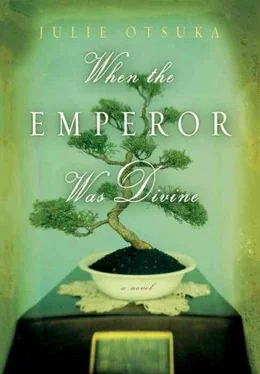She said she didn’t want rice. She didn’t want anything anymore. Not a thing.
But every once in a while she got a faraway look in her eyes and he knew she was thinking of some other place. A better place. “Just once,” she told him, “I’d like to look out the window and see the sea.”
ONE DAY she said she couldn’t bear it anymore. The wind. The dust. The endless waiting. The couple next door constantly fighting. She hung a white sheet from a rope and called it a curtain and behind the white curtain she lay down on her cot and she closed her eyes and she slept. She dreamed. Of warm nights in Kagoshima and chirping bell crickets and red paper lanterns drifting one by one down the river. “I was a girl again. I was five years old and fishing for trout with my father.”
“What kind of fishing pole?” asked the boy. “Was it bamboo?”
For the first time in months he thought he saw her smile.
“Yes it was,” she said. “Bamboo. Bamboo.”
IN THE HOUSE where his mother was born there were rice paper windows and sliding wooden doors and tatami mats that lay side by side on the bare wooden floors. In the evening she would catch fireflies in the rice paddies and bring them home in a brown paper bag. All night long she would sit at her desk and practice writing Chinese characters by the fireflies’ pale glowing light.
She said she’d had six older sisters and one younger brother who’d died of scarlet fever when he was four. “I still think of him every day,” she said. She said that once a year, on her birthday, her mother would make her rice with red azuki beans. “That was a treat,” she said, and then she grew quiet. She closed her eyes and lay very still on the cot. She lay there for a long long time, breathing slowly in and out until the boy could no longer tell if she was awake or asleep.
TWO NIGHTS BEFORE they had left for Tanforan he had helped her bury the silver in the garden beneath the statue of the fat laughing Buddha. It was spring, and the earth was black and damp and full of worms. He had watched them squirming in the moonlight.
“Hurry up,” his mother had said.
He had touched the worms with his shovel. Some of them he had cut in half. Then the moon disappeared and a light rain was falling and water was dripping down through the leaves and the branches and onto his mother’s face.
But even before the rain, he remembered now, her face had been wet.
“WHEN I FIRST MET your father I wanted to be with him all the time.”
“I know what you mean.”
“If I was away from him for even five minutes, I’d start to miss him. I’d think, He’s never coming back. I’ll never see him again. But after a while I stopped being so afraid. Things change.”
“I guess so.”
“The night of his arrest, he asked me to go get him a glass of water. We’d just gone to bed and I was so tired. I was exhausted. So I told him to go get it himself. ‘Next time I will,’ he said, and then he rolled over and went right to sleep. Later, as they were taking him away, all I could think was, Now he’ll always be thirsty. ”
“They probably gave him a drink at the station.”
“I should have brought it to him.”
“You didn’t know.”
“Even now, in my dreams, he’s still searching for water.”
IN THE MIDDLE of the night the boy thought he heard a sound. The steady thwack of a rope against dirt. He sat up and looked out the window and saw his sister jumping rope in the moonlight in her yellow summer dress. Her legs were long and thin. Her knees were scabbed. Her calves were pitted with scars from the sand and grit that blew night and day in the wind. She shouldn’t be wearing dresses, he thought to himself.
He went out and stood to one side of the door in the darkness. She did not see him and continued to jump. First on one leg, then on the other, then with her arms crossing and uncrossing until the rope pulled up short on her shoe and she tripped. She stomped her foot once in the dirt and tossed down the rope. “You better come in now,” he said quietly. “You’ll catch cold.”
She looked over at him. “How long have you been standing there?”
“A long time.”
“How did I look?”
“Good. You’re a good jumper.”
“I’m terrible. I don’t even deserve to hold the rope.”
He walked over to where she was standing and picked up the rope and looked at it. It was white and frayed. A piece of old clothesline she must have cut down from a pole. He imagined a line of white sheets sailing up into the air and out beyond the fence. “You better come in now,” he said again.
“I’m not here.”
He did not answer her.
“I’m a terrible jumper.”
“You’re awful.”
“The worst.”
He held out the rope to her. “Take it,” he said.
She grabbed one end of the rope and with the other end held tightly in his hand he led her slowly back into the barracks.
IN THE MORNING she woke burning with fever. Their mother brought her a tin cup filled with water and told her to drink but the girl refused. She said she wasn’t thirsty. “Nothing’s passing through these lips,” she said. She pulled back the blanket and began to pick at a scab on her knee. The boy grabbed her wrist and said, “Don’t.” She turned away and looked out the window. A woman in a pink bathrobe walked by carrying a chamberpot toward the latrines. “Where are we?” the girl asked. “What happened to all the trees? What country is this anyway?” She said she’d seen their father walking alone by the side of the road. “He was coming to take us away.” She looked down at her watch and asked how it had gotten to be so late. “It’s six o’clock,” she said. “He should have been here by now.”
IN FEBRUARY a team of army recruiters arrived looking for volunteers, and the loyalty questionnaire was given to every man and woman over the age of seventeen.
Are you willing to serve in the armed forces of the United States on combat duty, wherever ordered?
The man next door answered no and was sent away along with his wife and his wife’s mother to join the other disloyals at Tule Lake. The following year they were repatriated to Japan on the U.S.S. Gripsholm.
Will you swear unqualified allegiance to the United States of America and faithfully defend the United States from any or all attack by foreign or domestic forces, and forswear any form of allegiance or obedience to the Japanese Emperor, or any other foreign government, power or organization?
“What allegiance?” asked the boy’s mother. She said she had nothing to forswear. She’d been in America for almost twenty years now. But she did not want to cause any trouble—“The nail that sticks up gets hammered down”—or be labeled disloyal. She did not want to be sent back to Japan. “There’s no future for us there. We’re here. Your father’s here. The most important thing is that we stay together.”
She answered yes.
They stayed.
Loyalty. Disloyalty. Allegiance. Obedience.
“Words,” she said, “it’s all just words.”
INSIDE THE RUSTED PEACH TIN, a sudden burst of yellow.
The boy touched the petals with his finger again and again. “Gloria,” he whispered. It was March, and the nights were no longer so cold. The scorpions had become numerous again, and the earth was beginning to soften. The girl shoveled up spoonfuls of sand from beneath the barrack window but she could not find the tortoise. “He left without us,” she said.
Only the willow trees had not survived the winter. Their sap had not risen. Their branches were still bare. The girl broke off a twig and put it between her teeth. “Dead,” she said.
Secretly, the boy blamed himself. I shouldn’t have plucked that leaf….
Читать дальше












